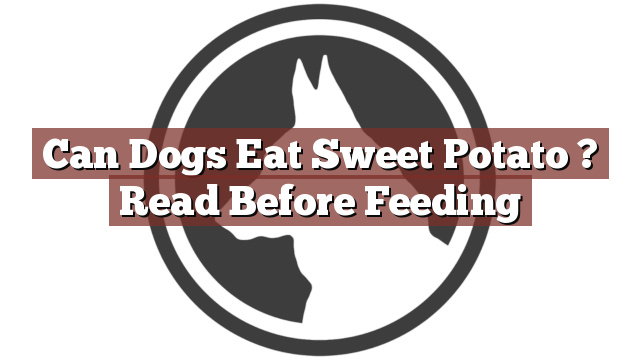Understanding Your Dog’s Dietary Needs
As a responsible pet owner, it is important to understand your dog’s dietary needs to ensure their overall health and well-being. Dogs require a balanced diet that consists of proteins, fats, carbohydrates, vitamins, and minerals. While their primary source of nutrition should come from high-quality dog food, it is natural to wonder about incorporating other foods into their diet. One common question that arises is whether dogs can eat sweet potatoes.
Can Dogs Eat Sweet Potato? Read Before Feeding
Can dogs eat sweet potatoes? The answer is yes. Sweet potatoes can be a healthy addition to your dog’s diet when prepared properly. They are rich in fiber, vitamins A and C, and minerals such as potassium and iron. However, it is essential to ensure that the sweet potatoes are cooked thoroughly and served in moderation. Feeding raw or uncooked sweet potatoes to your dog can lead to digestive issues or even pose a choking hazard.
Pros and Cons of Feeding Sweet Potato to Dogs
Feeding your dog sweet potatoes in moderation can have several benefits. The high fiber content in sweet potatoes can aid in digestion and promote a healthy bowel movement. Additionally, the vitamins and minerals present in sweet potatoes can boost your dog’s immune system and contribute to a healthy coat and skin.
However, it is crucial to consider the potential drawbacks as well. Sweet potatoes are relatively high in carbohydrates, so if your dog has specific dietary restrictions, such as diabetes or weight management issues, it is best to consult your veterinarian before introducing sweet potatoes into their diet. Additionally, while sweet potatoes are generally safe for dogs to eat, individual dogs may have different sensitivities or allergies. Always monitor your dog for any adverse reactions after introducing a new food.
In Conclusion: Consider Sweet Potato as a Nutritious Addition to Your Dog’s Diet
In conclusion, dogs can eat sweet potatoes, but it is vital to feed them in moderation and ensure they are cooked thoroughly. Sweet potatoes can provide valuable nutrients and be a healthy addition to your dog’s diet. However, it is always wise to consult with your veterinarian before introducing any new food into your dog’s diet, especially if they have specific dietary restrictions or known sensitivities. By understanding your dog’s dietary needs and making informed choices, you can help them maintain a balanced and nutritious diet that supports their overall health and well-being.
Thank you for taking the time to read through our exploration of [page_title]. As every dog lover knows, our furry friends have unique dietary needs and responses, often varying from one canine to another. This is why it's paramount to approach any changes in their diet with caution and knowledge.
Before introducing any new treats or making alterations to your dog's diet based on our insights, it's crucial to consult with a veterinarian about [page_title]. Their expertise ensures that the choices you make are well-suited to your particular pet's health and well-being.
Even seemingly harmless foods can sometimes lead to allergic reactions or digestive issues, which is why monitoring your dog after introducing any new food item is essential.
The content provided here on [page_title] is crafted with care, thorough research, and a genuine love for dogs. Nevertheless, it serves as a general guideline and should not be considered a substitute for professional veterinary advice.
Always prioritize the expert insights of your veterinarian, and remember that the health and happiness of your furry companion come first.
May your journey with your pet continue to be filled with joy, love, and safe culinary adventures. Happy reading, and even happier snacking for your canine friend!

